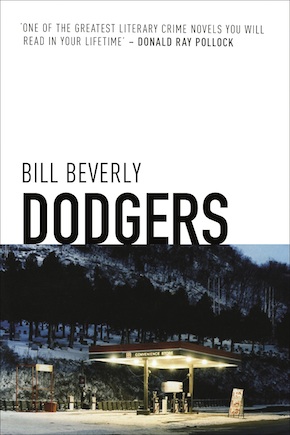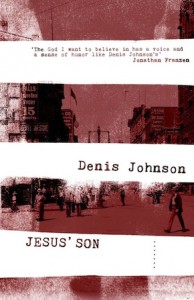American road epics
by Bill BeverlyAmerican stories are road stories. We are aware that others do road stories. We are aware that others did them before us. We read Dante, some of Cervantes, and we saw Mad Max twelve times. But no other people set such stock by their road narratives. Nobody churns out so many, or believes them so faithfully. The US has a lot of roads.
I made this list of brazen idiosyncrasy. It might have aimed at greatness; it might have attempted to be fair or correct. But I don’t want to write about Steinbeck or Hurston. Plenty of other people will pick out the greatest Westerns for you. Bonnie and Clyde and Badlands and Easy Rider seem too obvious. And I never liked On the Road.
The Fugitive Blacksmith; or, Events in the History of James W.C. Pennington, Pastor of a Presbyterian Church, New York, Formerly a Slave in the State of Maryland, United States (1849)
Collectively, the narratives of escaped Southern slaves are one of the great foundation stones of American literature. For casual readers or devoted researchers, the University of North Carolina’s Documenting the American South website offers a virtually comprehensive collection.
My favourite is James W.C. Pennington’s, a recounting of his escape from bondage on Maryland’s Eastern Shore. The landscape is mysterious and hostile – but no more so than each person Pennington might encounter below the Pennsylvania line. Inflected by his career as a pastor, but true to the fugitive’s eye, this is a chilling tale of evasion and survival. Dodging north through a cold landscape, “only now and then I was cheered,” Pennington notes, “by the wild hope that I should somewhere and at sometime be free.”
The Adventures of Huckleberry Finn (1884)
A road story without a road. But without it, there’s no list.
In Huck, there’s nothing worse than staying home. Huck’s father is the town drunk. He beats his son, neglects him and extorts from him, kidnaps him. Then there are the townswomen who would rescue Huck: “Miss Watson would say, ‘Don’t put your feet up there, Huckleberry,’ and pretty soon she would say, ‘Don’t gap and stretch like that, Huckleberry – why don’t you try to behave?’ Then she told me all about the bad place, and I said I wished I was there.”
Gliding by the muddy squalid towns is the Mississippi River, both avenue and refuge as Huck rides a raft from Missouri down to Arkansas, sometimes with and sometimes without escaped slave Jim. Sometimes Huck torments Jim. Sometimes he sees Jim anew with a tender, filial kinship. In this dark, rambling book, first published in England in 1884, Twain proves that Americans don’t need cars to hit the road.
Gun Crazy (1949)
Irish actress Peggy Cummins is incandescent as Annie Laurie Starr, an Annie Oakley-type sharpshooter gone bad. When she meets cool-eyed fellow shooter Bart Tare, the sexual energy drowns out even the gunfire. They make their escape from the travelling roadshow with gunfire; they attempt to settle down and go straight, but there’s no fun in it. There’s no noise. The bank robbery scene was done in one shot: B-movie sweat at its best.
Lolita (1955)
A loved book, a scorned book. Humbert Humbert sells it as a love story – but Humbert is a poor professor and a windbag, his classical references wobbly, his style deep purple. He is an abuser and a killer. He is a noxiously solipsistic narrator. And he gets the love story backwards: twelve-year-old Dolores, despite her suffering, is little more than sullen scenery. It is the landscape that he attends to lovingly, the “so-called coffee shop” and “second-rate lake” that figure as destinations for his depravity. It’s an American travelogue by a lover who can’t quit his contempt – but can’t stop staring, either.
The Graduate (1968)
If Mike Nichols’s adaptation of Charles Webb’s novel seems out of place here, remember: the moving sidewalk. The trips up to Berkeley. The aerial shots of the car crossing the bridge. The wild sprint to the church, and the last shot at the back of the bus. And the Simon and Garfunkel soundtrack, perfectly deployed – these songs never sound complete to me if they’re not backing the movie. So what if it never leaves California? Isn’t California enough?
True Grit (1968 by Charles Portis, and 2010 by the Coen Brothers) and Thelma and Louise (1991)
Back to Arkansas. We’ll always have Arkansas.
Portis’s novel sends young Mattie Ross out on a mission to avenge her father, murdered by the coward Tom Chaney. She hires ruthless bounty hunter Rooster Cogburn, then is crestfallen to learn that Chaney is already hunted by brassy Texas Ranger LaBoeuf. Nonetheless she sets out with this most ill-met hunting party, past Fort Smith and west into Oklahoma, Indian Country – which, come to notice, is the same route (these days it’s Interstate 40) that heroines Thelma and Louise follow once their wives’ weekend away is scuttled by a would-be rapist at a roadside honky-tonk. Where Mattie learns the ways of men and guns and long hauls, Thelma and Louise go it alone against a gallery of cartoonish males – and the young, slinky Brad Pitt, all Yes-ma’am and quiet treachery. Ridley Scott paints the dusty Southwestern landscape into neon. If you think all Arkansas ever gave the world is WalMart and the Clintons, these two stories will recoup the Razorback State for you.
Oh, and please watch the Coen Brothers’ lush and burnished remake – because the 1969 movie that earned John Wayne his Best Actor Oscar is slower than the Duke’s drawl.
Story, stories. Whether this is a rather disjointed novel or a collection of linked stories, we can fight until the class bell rings. What it is is one of the best, strangest books of the last forty years. The druggy yearning of the narrator, a thousand-time loser with a name unfit to print, takes him to the edge and over. He cannot break his fall; he can only try to recover after it. The driving isn’t the long-road-to-salvation continent-slashing haul we get from The Grapes of Wrath. It’s the stoned horror of ‘Car Crash While Hitchhiking’ where the narrator is taken in out of the rain just before a bloody and fatal wreck. It’s the car chase in ‘Two Men’ or the sixty-dollar Chevrolet in ‘Work’, or the long, severe Old Highway down which Georgie and the narrator rescue the AWOL soldier Hardee in ‘Emergency’. It’s the summer we all were twenty and we ditched our lousy jobs and tried to see just how long we could live and stay stoned on the few dollars we had left or could still scrounge. And at the end, in the cool desert quiet of ‘Beverly Home’, it’s a life without cars that gives our wanderer his best chance at fitting in, at finding some place where he might be able to stop.
Dead Man (1995)
At first I had Jim Jarmusch’s Stranger Than Paradise on this list. It’s omission is barely defensible: it was cool and indie when I was young enough that being cool and indie meant everything. It offers Jarmusch’s jaundiced take on the landscape: Cleveland, New York, Florida. It is the coolest story of these ten, or would be, if I had not kicked it off.
Fifteen years later, Jarmusch made his absurdist road epic Dead Man. It is a homage to everything and nothing at the same time: a Western, a Bildungsroman, a lam flick, a buddy film. Johnny Depp plays a timid accountant for whom taking a position way out west is, he recognises immediately, a mistake. That the characters are cartoons is undeniable – but the black-and-white photography is majestic, the physical humour consistent. And Neil Young’s score coils quietly in the brush, like a snake in wintertime.
The Road (2006)
To like The Road among Cormac McCarthy’s true believers is to like Let’s Dance among David Bowie’s: it was a hit, it aimed to please, it brought all these hollering newbies to the concert, where they stumbled around and pretended they’d been there all along. The problem is, like Let’s Dance, it’s a pretty great piece of work, no matter what you hold against it.
Aimed to please? McCarthy’s post-nuclear hell is relentless, savage, howling. The American present is the dimly recollected past for his characters: it is unrecoverable; it is day by day less real. A father and son tramp south to the ocean, where there may or may not be hope. When they find, somewhere in the middle of the book, some family’s abandoned and unlooted fallout shelter, it is a visceral reprieve. When they leave it again, I almost grieved. The book is our best cousin to the Road Warrior/Mad Max films, but a prequel – before everything is covered in spikes and hyperbole, while people still hurt.
 Bill Beverly was born and grew up in Kalamazoo, Michigan. He studied literature and writing at Oberlin College, including time in London studying theatre and the Industrial Revolution, then studied fiction and pursued a PhD in American literature at the University of Florida. His research on criminal fugitives and the stories surrounding them became the book On the Lam: Narratives of Flight in J. Edgar Hoover’s America. He now teaches American literature and writing at Trinity University in Washington, DC and lives with his wife, the poet and writer Deborah Ager, and their daughter Olive in Hyattsville, Maryland. Dodgers, his debut novel, is published by No Exit Press. Read more.
Bill Beverly was born and grew up in Kalamazoo, Michigan. He studied literature and writing at Oberlin College, including time in London studying theatre and the Industrial Revolution, then studied fiction and pursued a PhD in American literature at the University of Florida. His research on criminal fugitives and the stories surrounding them became the book On the Lam: Narratives of Flight in J. Edgar Hoover’s America. He now teaches American literature and writing at Trinity University in Washington, DC and lives with his wife, the poet and writer Deborah Ager, and their daughter Olive in Hyattsville, Maryland. Dodgers, his debut novel, is published by No Exit Press. Read more.
dodgersanovel.com
@BillBeverly
Author portrait © Deborah Ager



